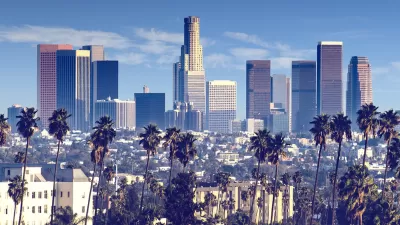A Donald Shoup devotee offers new insight into the problems and solutions associated with parking in Los Angeles and other cities. Urban Planning professor Richard Willson says it'll cost you, but parking systems are going to get more efficient.
"'No one likes to pay for parking but residents are going to pay for it in other ways,' he says over coffee at Café le Leche on York Boulevard in Highland Park. Even if you find a 'free' parking spot, it’s not free, contends Willson who says that the true cost of free parking dominoes into higher rents/mortgages for developers and tenants not to mention merchants who, in turn, raise prices on goods and services and often lower workers’ wages. Plus, studies show that free parking creates more single drivers, adds to pollution, contributes to congestion as we cruise for curb parking, and well, the list of ills goes on."
Although these ideas have been well-established, Willson's new book, Parking Reform Made Easy, builds on the foundation laid by Shoup. His book includes parking reform success stories that have been implemented since The High Cost of Free Parking was published in 2005, writes Brenda Rees.
"Willson discusses the future of paid parking in the form of the ubiquitous parking meter. Cities, he says, are seeing good use of meters these days thanks to a federal grant which allowed them to swap out coin-only for the ease of credit card. No more fumbling around for quarters. Swipe and go."
"Technology won’t stop there, says Willson. He’s seen the future and in the works are meters that — via smartphones – can contact you when the meter is going to expire. In addition, you could then pay for addition time on the meter remotely with your smart phone thus extending your evening at your favorite restaurant or bar."
"'It's all about making parking easier for everyone,' he says. But, as he said earlier, it won’t be free."
FULL STORY: Mt. Washington man offers solutions for parking problems – but they are going to cost you

Planetizen Federal Action Tracker
A weekly monitor of how Trump’s orders and actions are impacting planners and planning in America.

Chicago’s Ghost Rails
Just beneath the surface of the modern city lie the remnants of its expansive early 20th-century streetcar system.

San Antonio and Austin are Fusing Into one Massive Megaregion
The region spanning the two central Texas cities is growing fast, posing challenges for local infrastructure and water supplies.

Since Zion's Shuttles Went Electric “The Smog is Gone”
Visitors to Zion National Park can enjoy the canyon via the nation’s first fully electric park shuttle system.

Trump Distributing DOT Safety Funds at 1/10 Rate of Biden
Funds for Safe Streets and other transportation safety and equity programs are being held up by administrative reviews and conflicts with the Trump administration’s priorities.

German Cities Subsidize Taxis for Women Amid Wave of Violence
Free or low-cost taxi rides can help women navigate cities more safely, but critics say the programs don't address the root causes of violence against women.
Urban Design for Planners 1: Software Tools
This six-course series explores essential urban design concepts using open source software and equips planners with the tools they need to participate fully in the urban design process.
Planning for Universal Design
Learn the tools for implementing Universal Design in planning regulations.
planning NEXT
Appalachian Highlands Housing Partners
Mpact (founded as Rail~Volution)
City of Camden Redevelopment Agency
City of Astoria
City of Portland
City of Laramie




























